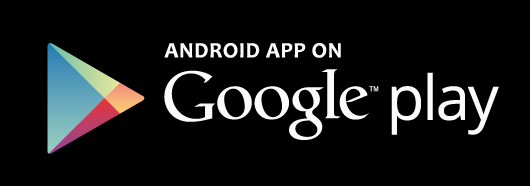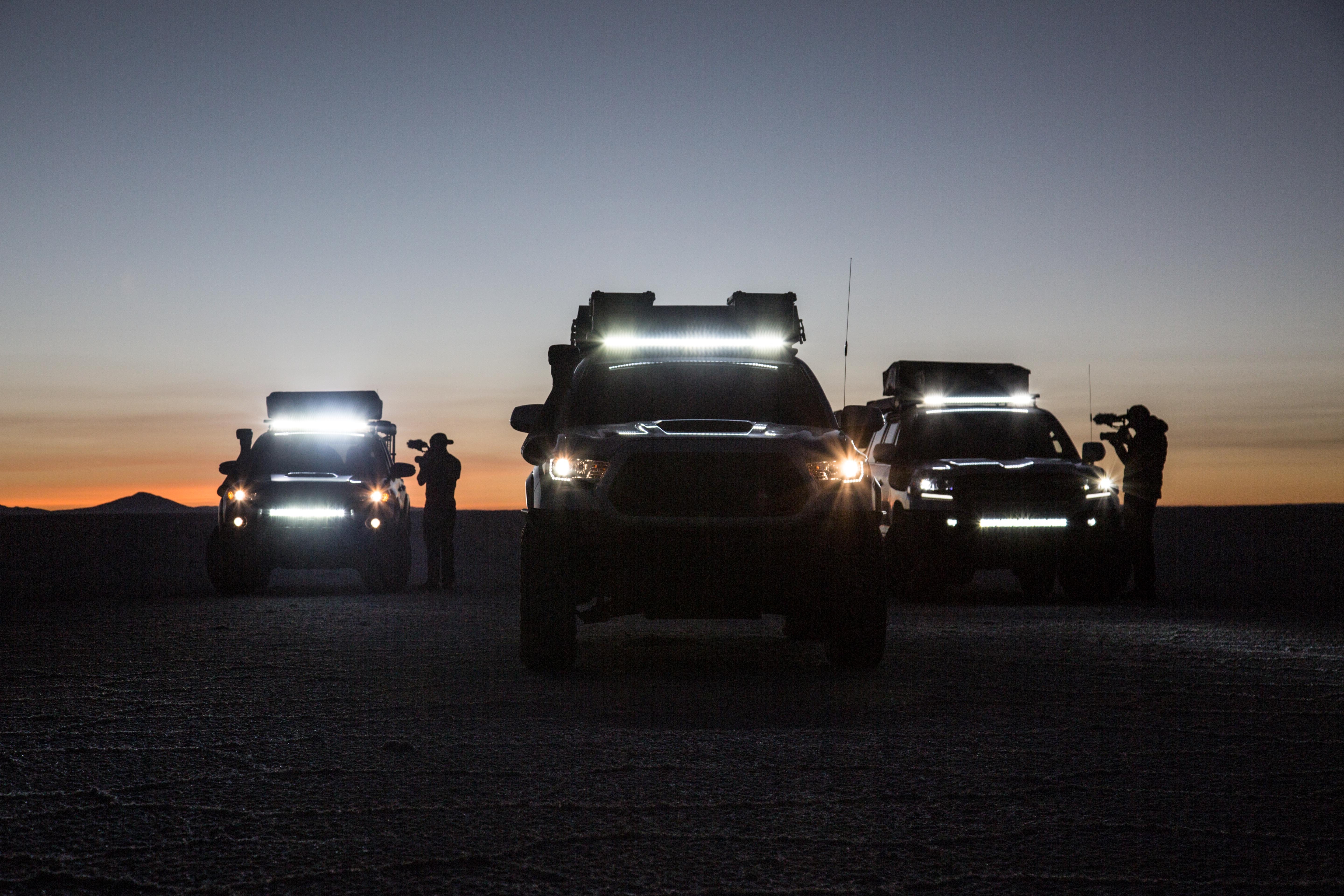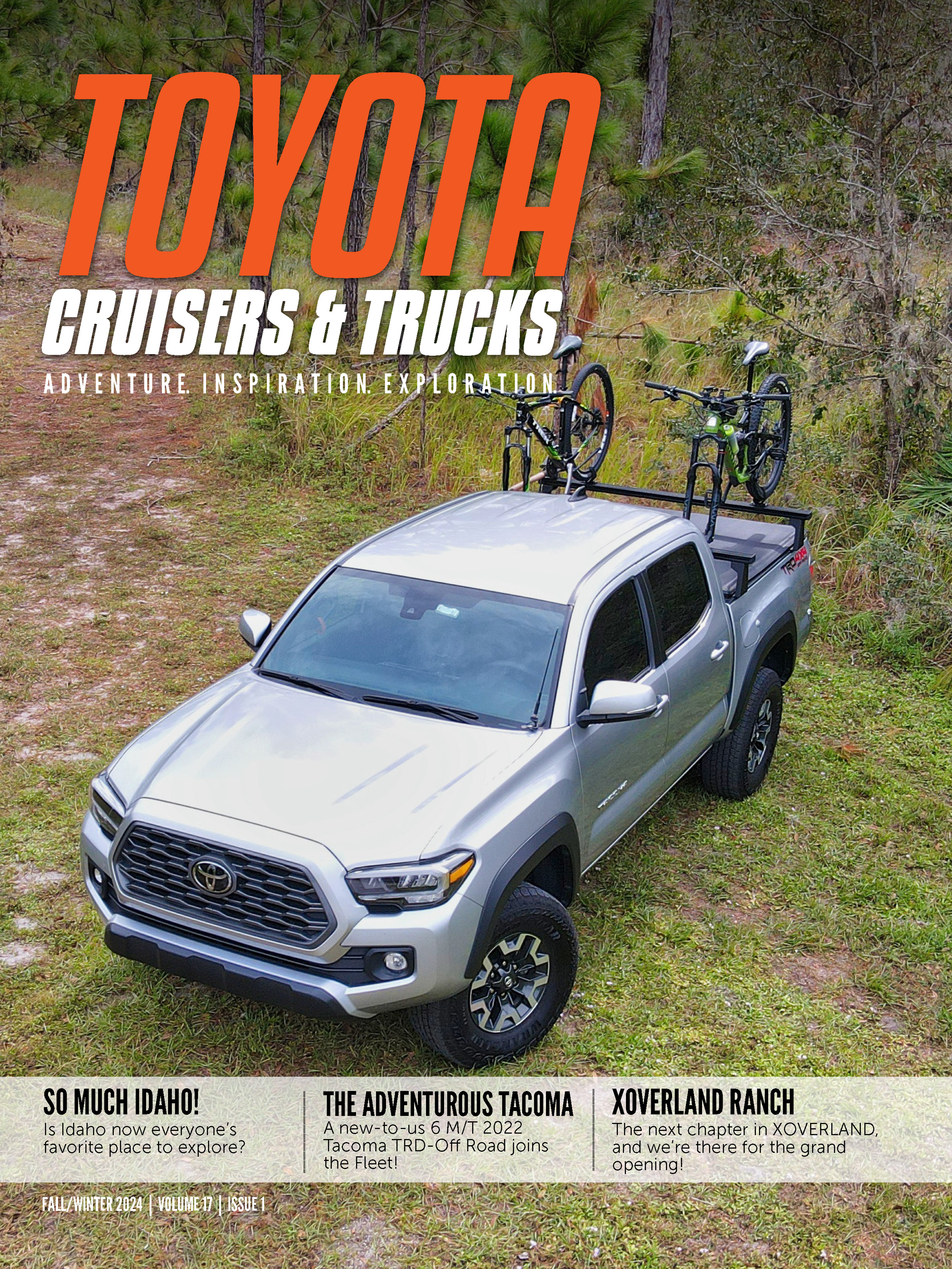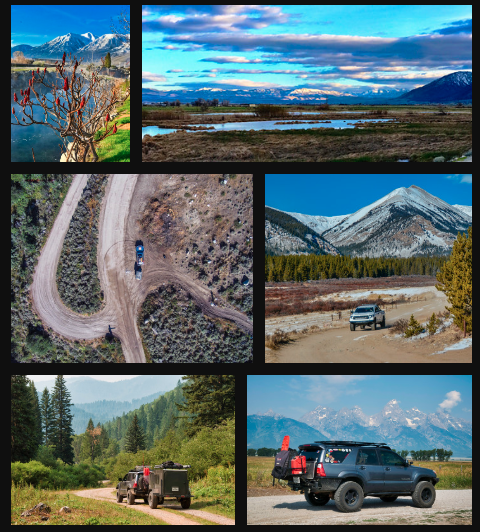During our interview we covered how I first found out about XO, how they had to basically learn everything there is to know about building a production company in a very short time, and some ideas of what’s coming next for Expedition Overland.
Shane Williams: So first, maybe let’s go over the first time I ever met you. It’s so burned into my brain because this was the first SEMA show that I'd ever been to, in November 2011. My colleague Jim Akers & I flew in very late, it was like midnight I think, and as soon as we hit the ground we texted a couple of people to find out where the parties were. It turns out that the Overland Journal (OJ) party was still rocking at the rental house, so we decided to check it out.
So we show up super late at night and there's only five or ten people hanging around. The cool part is that on the plane ride in, I was telling Jim about this brand new Expedition Overland thing I just saw on YouTube. So we walk into the OJ party and I said “Hey, that's the guy that I just saw on this awesome new series”
So that's the first time I ever had any interaction with XO, and with you. That's totally burned into my brain. I can't think of any SEMA show without thinking of that.

Clay Croft: That was also our first show, and that same party when I got to know Scott Brady a little better, and I met Bruce Dorn, then I met Brad McCarthy of MAXTRAX, who became our first sponsor ever and is still our longest running sponsor. They’ve sponsored us every year for 10 years.
SW: So that’s where a lot of things started for both of us. I still remember seeing that original show and how inspiring it was (and still is). Maybe let’s break down the XO history into stages, if that sounds OK?
CC: Yeah, let's break it down that way. So the original content that we first launched was a concept, also a lot of people don't remember that when we first launched YouTube didn't allow videos over two minutes long, so it had to be on Vimeo. Then they increased the video link to ten minutes on YouTube, and then not long after that they finally blew it wide open (on video length) and then that's when we were able to fully move to YouTube. So we've been around longer than we could even be on YouTube.
Also, originally when we first started building this, online streaming services were not a thing. You could get Netflix through mail order, or you went to the Redbox to rent your movies for the night or the weekend. Or you could download some movies at the time through Apple.
SW: Yeah, the iTunes store was just coming out, probably.
CC: Just coming out for videos, and so we were under the model that we were going to have to build content for television. That's what started the quality of XO, because we had been shooting other things in our careers for television. Our project didn't become XO for a little while, but the concept of Expedition Overland was built for outlets like Outside TV, et cetera, but we were striving to hit the Discovery Network quality at the time, the old Discovery.
So that's what we were trying to hit. You know, you always reach for something that you probably can't hit, but you should certainly try. So that's what started our standards and our achievements.
Plus, we saw this as the next step in our filmmaking and storytelling careers, and we knew that we had to hit newer, better stories, cinema levels and sound levels, and music quality, all that stuff to get to those other playing fields. Of course, that never developed, they [Discovery, etc] never came online and it's for the better. I'm so glad we never went to television because as we got into the business, we realized just how much control networks have over what is created, especially when they buy your content. That would have ruined us from day one.
So once we got into it, we realized that we don't want to have Discovery tell us how many fights to have in the car between point A and B. We don't want stuff to be broken on purpose just to create drama. There's a better way to do it, so we just stayed online and kept doing our own thing, you know?
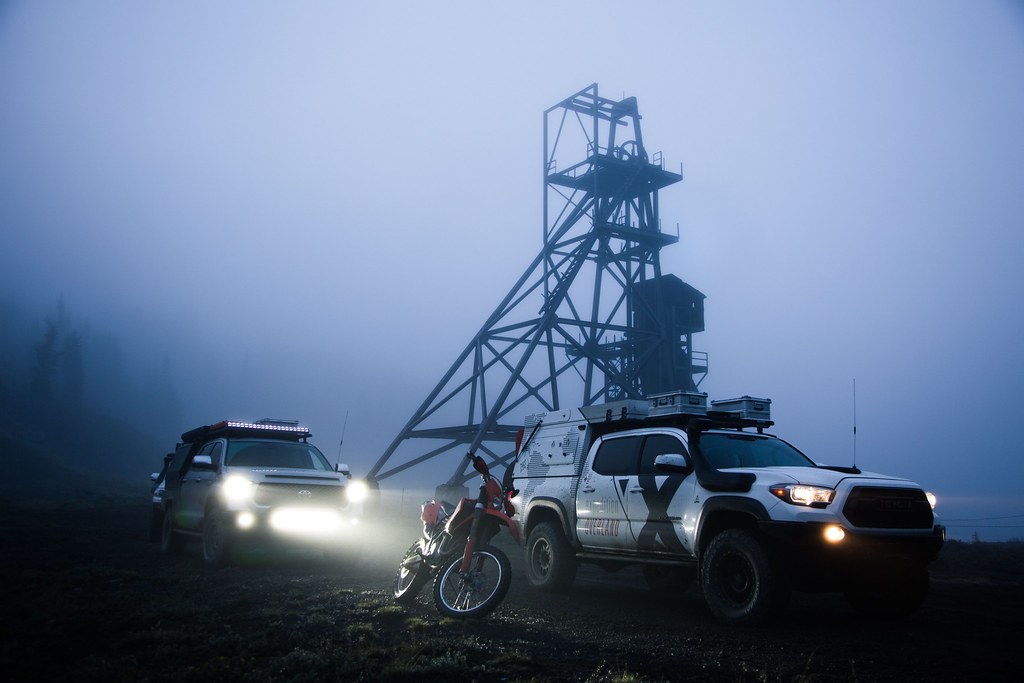
SW: It seems like it was probably a lot harder, right? You are filmmakers that now have to run the whole business side of it, and the whole sponsorship side of it. I mean, we've been doing magazine for 13 years and I'm still struggling at the sponsorship side of it. We’re pretty good at the content, and I can handle that pretty well. The sponsorships.. paying for stuff could definitely use some help.
CC: We had to turn into a full production company that typically requires many people to run with specific expertise, and we just had ourselves. It was just for Rachelle and I for a long time, for like three years. I think our first full time hire was Scott Cahill, and he came on four years into the project.
SW: Wow, your first full time hire didn't happen until four years into Expedition Overland’s content creating business?
CC: It took that long to be able to support somebody else. Also, Expedition Overland itself didn't turn a profit for eight years.
SW: Which is what they say about most small businesses, it's three to five generally so eight years is quite the struggle.
CC: Yeah, and we still every year struggle to make profit.
SW: Well, your team seems to get things done! So, how many full timers do you have now?
CC: There are six of us running full time right now. Then we have one, two, three…. three others that are part time. So we're running a team of nine core.
So, to backtrack a little. We know we had to become a production company, which means that we had to learn how to be sales, and go after sales for sponsorships. We had to learn marketing. We had to learn to tell our own story. We had to learn to build trucks.
All of that, and all of it at once.
Plus, we had little kids in the house and it was tough. I'm very glad I was younger when I did that.
SW: It's not only what we see on the channel, right? It's not only, “oh, we're just off having fun”. Actually, I'll take that back. I think you guys have traditionally done a really good job of trying to expose at least a little taste of the complexity and all the craziness that goes into it, and the difficulty that goes into making this. Also knowing that it's still only a tiny piece, it would probably not be super exciting if it was a full-on reality show and you had cameras running 24/7, you know, in the hangars, like covering everything.
CC: You'd be seeing me watching and previewing stuff, giving critiques to things, writing emails, taking phone calls. You know, it's all the same stuff that a lot of us are all doing to run businesses. Also, we typically work for 16 to 18 months for a single project to go live.
Yeah, at least 18 months. Right now, I'm working on next year's projects that will shoot in the summer and won't be finished until next February. It's not even February right now.

SW: So what you're going to shoot next summer (2021) won't see the light of day until February, 2022. I guess that makes sense because of all of the back work to even get it cleared to roll, right? Months and months and months of planning and effort. Again, I think that you exposed some of that, but it literally is not just for show. It actually takes all of that time to plan an adventure.
CC: Yeah. So we had to learn that right at the beginning. We had to learn what it takes to spin up a show to have the proper equipment, the proper planning, the proper funding, the proper permitting and insurance, and of course all of the skills that you needed to pull it off.
Then you had to go film it: do the trip, film it, then you had to have the post-production skills, which is really where a lot of time is put into making a final product. All of our stuff is sound leveled and mastered for broadcast, so that it can migrate to other bigger platforms, and we've done that since day one. So, it's checked on multiple systems. It's proofed, and that takes a long time. If we shoot for six weeks, in the field, we're editing for four months.
And that's fast, you know, that's crazy fast.
SW: And the 12 hour days and the long nights and the early mornings ….
CC: And the Fridays and Saturdays and Sundays to get it ready. I think Scott Brady once said, and it's always stuck in my mind, “If you want to make a million dollars in the overland industry, start with $2.”
You know, it's a tough business to be in, especially because we were very early, when we first started. What was overlanding? No one even knew what it was, people would ask, what is that? People were asking “What’s a roof top tent?” Now it’s an everyday concept, but back then, to go and talk to sponsors about what we were doing was difficult. It was literally cold calling everybody because they didn't even know what it was, other than the critical companies that built stuff specifically for trucks. Ex Officio, for example, our first clothing sponsor, we had to tell them, and fill them in on what overlanding was.
Even WARN and a lot of our first companies and sponsors that we worked with didn't know what overlanding was initially, but they liked the idea. So they bought into Expedition Overland to tell that story.
So it was crazy, the amount of education. We don't do that anymore, we don't have to educate our sponsors or potential sponsors. People just know what overlanding is.
So, yeah, we did our first series of six and that was the proof of concept. Then we decided we wanted to do something big to stretch ourselves, and for most people that looks like Alaska and the Yukon. So, then we worked for a year and a half to get that project underway, which was an accomplishment.
Then while we were up there, we got the big vision of wanting to do the whole entire Pan American, which at the time and for years seemed… unattainable.
It just seemed like that was so much work ahead of us to be able to achieve something like that, and it took everybody years of work. So, from time of concept to the time that we finished the Pan American, it took us seven years to do those three series.

We found the cadence about every other year doing a big expedition, we didn't realize at the time, but it's kind of now designed that way. We found out by necessity that if we tried to do a major expedition every year, it's just not sustainable. Even with me on three trips every year, I couldn't grow the business, I couldn't get it to a place where it could be thriving.
It's just far too expensive and costly to do those big trips. So, about every other year was the cadence. That's why it ended up taking seven years to do the Pan American. Then once we were done with Pan American, I've talked about this before, XO kind of went through like a vision fatigue stage, due to me. We didn't know what to do next.
We had been focusing so hard on completing the Pan American heads down, do whatever it takes to complete that, we didn't have a lot of time. I didn't have time or headspace to think outside of that for a long time. Then all of a sudden it showed up.
So that process started an experimental time with Overlander. Then the Great Pursuit series, and now this year, the Solo Series. That has really allowed us to experiment with different things and grow as a channel, and it wasn't perfect, you know. Just like everything else, we’ve wrestled with it. Trying to figure out what we want where we want to go, but that's part of discovery.
You just have to put in the work and go for it and take what you learn and apply it. Overlander was built to satisfy all of the requests for the weekend warrior that we're getting. Yeah, the comment would be, I love that you are down in South America, but I'll never go do that. How does that apply to me?
So, we went and built 15 episodes online and we're going to be releasing 12 of them on Amazon coming up. Catered to the adventurer on his or her weekend warrior two, three, or four day trips. Those are very specifically built for that.
Then we wanted to make sure that we did the Pan American it’s full justice, and that's how we got into the Great Pursuit series. At the time, frankly, driving around and exploring the US is extremely easy and simple, there's not a lot of challenge but there is a whole lot of relaxation and cool places to see. It's really easy, you know, in our opinion, through our experience, so that's why we felt like we wanted to add the personal passion of wanting to fly powered paragliders. To see the world and travel in a different way and take on new skills and try new things. Which was a very unique experience.
I think it made us better adventurers as a whole because of all the new skills and concepts that we picked up from doing a trip like that. It doesn't perfectly apply to every person’s concept of travel, but the adventure was there. It was also a really hard season to do, but I think we learned a lot from it.
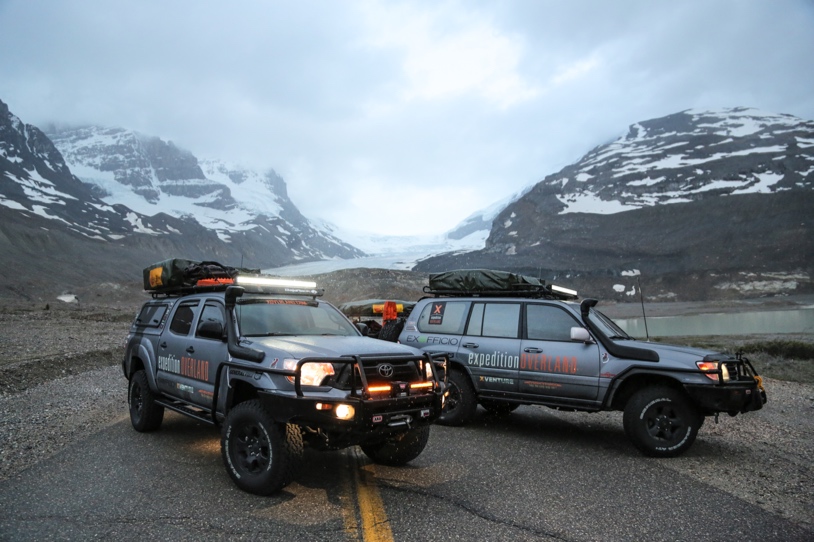
SW: I remember the first couple of first comments that I read: “so what are they doing flying around and things?” Personally, I really like that it was all about adventure. I enjoy that there are different ways to explore and find adventure for different people. Some people backpack, some people mountain bike, some people hike. I enjoy consuming a lot of it and knowing about all the different things. That doesn't mean I'm going to go out and try everything.
It's just cool to see adventure and to see it well done and to tell the story. That's really what we're all talking about here, is telling that story. In the early days of XO, every time I would watch one of your episodes, I would text you about four minutes later saying, “man, so amazing, such great inspiration. I'm probably not going to go do that, but I'm going to go do this other thing because I'm inspired.” I've always felt that inspiration when watching XO, and I think a lot of other people do too.
It's great to hear about the experimentation and just trying different things just to see what works. The fact that you're able to do those experiments through all the hard work of the seven previous years, you were able to set yourselves up and, in some way, so that you could do the experimentation.
On that note, I’ve really enjoyed the Solo series just because it’s different. It's people that are going out doing adventures, who are not professionally trained cinematographers. As much as I always love your cinematography, it's cool to see this family going out on an adventure that could be a series of weekends. Those are probably my favorite. Other than the Pan American, obviously are the best.
CC: You know, that connects with people. Solo is there because a lot of people travel as one truck. Going out to experience something, and yet we still sent them on big things. The easiest one that I went on was my own, but the Giordanos going to the Arctic in the middle of March, which is the hardest month to be there, is pretty aggressive. So, there was a lot of challenge there. But, hey, if they can do it solo in this one truck and go all the way up there, you can go out this weekend and do something fun.
Then the Walthall’s spent three months out. Originally, they were going to be gone for six months in Australia, but COVID changed that, obviously. Then they adapted and were able to take on adventure here at home. They didn’t allow the circumstances to dictate their life. They had to adjust their life, but they still went and found adventure. They still lived on the road. And they will tell you that they had one of the best summers of their life because of it.
So, it looked different than what they wanted, but they worked through it. Now there's a series coming out on that. Then our (the Crofts) Solo series, will come out in March (Watch it HERE). So that's how we got there.
That's all the series.
SW: So that leads me into the last part of my curiosity… what's next. You've talked about a series that you're planning in the future, and obviously you don't want to have too many spoilers, but I'm not even thinking next year, I’m wondering about the next 10. Is the is the vision for fatigue still kind of set in? Or have you come to a point where you kind of see it unfolding.
CC: We absolutely know what we want to do for the next 10 years.
That is to help grow, guide and lead the overland industry as it matures.
With the greater interest that it is now gotten.
You've seen us partner with Overlander.com so that we can curate an online resource of only good equipment, so that we can keep out a lot of the junk and things that aren't proven and good. There's at least a concise location to get quality gear and education. It will also help cut through the noise, and that that site's really new, but it's going to grow a lot over the next 10 years.
Then we have our own visions of doing big, big series. Films that inspire.
It's built to help the overlander be who they are.
It's like for the first 10 years, Expedition Overland was about pursuing our own passions and things that we loved. Now we've switched gears and we know that, OK, we feel very fortunate what we've been able to do.
Now we want to continue to build and grow companies and inspiration for the people that are coming behind this that are. So that we can inspire them to do what they need to do and go on their own adventures even more.
So that's the focus now, whereas before it was kind of an inspirational side effect.
Now it is the purpose.
SW: I think that sounds pretty awesome!
CC: And we're still going to be doing big stuff. I'm going to be focusing on trips and movies are that are really important to me. Then we will be working with other teams and people to do more Solo series, et cetera, that we can now inspire other people or fund people to go do and shoot their stories like the Giordano's and the Walthalls and et cetera.

SW: Absolutely! You said movies. Are we talking like feature length?
CC: Yeah, so we did Wulff Land, and of course, I get that question 30 times a day: “When is that movie coming out?” The answer is, I don't know. I don't own that film, so I can't tell anybody what to do with it. But since we did produce one of those films, we see that the medium of filmmaking, that type of storytelling is very powerful.
A very condensed 90-minute film versus a series, it has its own way of making a different sort of impact. So, in the future, I would like to do more films as well that would maybe launch once a year, or every other year maybe we do a movie or something like that. These are all just concepts, and we'll have to see how it goes. Then of course right now, the world is really hard to travel in, and it's tough to be a global overlander because the globe is closed. We're have to be very creative.
SW: So, you end up doing things that are maybe a little closer to home. That’s good for the short term, perhaps, but I could see how long term that could end up getting a lot more challenging as the months turned into a year or more. So yes, I see how that can definitely be a challenge.
Wow, Clay, I appreciate the time today. It's always awesome to catch up with you and you and I could talk for another four hours.
I’ll finish up with links to all the Expedition Overland things:
XOverland.com, and of course your YouTube channel.
You can also binge past seasons on Amazon Prime.
Find the best tested gear on Overlander.com
And the 10 Years of XO Tribute Video:
[flickr set=72157719149101759]
To get your copy of the
Winter 2021 Issue:
Follow us on Facebook, Twitter, and Instagram to get up-to-date industry news, events, and of course, amazing adventures, stories, and photos!


